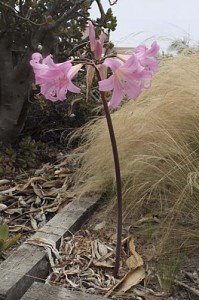
Early last week, while I was working, John had a chance to go up to Northridge and visit his aunt for a few days. As part of the long weekend he was able to go to the aunt’s sister’s house and raid her plum tree. “You couldn’t tell I touched it,” John said, referring to the number of fruits the tree still had on it. He came home with maybe five or six pounds of them.
When you have a small crop of anything you savor every single fruit. But with this many I could splurge, and breakfast Sunday included a plum tart. Photographing something purple-black against a white background turned out to be a little too much contrast to make the picture look that appetizing. But hot out of the oven it wasn’t bad. (I must admit, though, that John might be getting tired of this blogging thing, with me going, “Wait a minute. We need a picture before we eat it…” I can just see the next tell-all book to hit it big: I married a blogger…)

Outside, things were blooming. The first of the month brought this big burst of Lycoris squamigera Amaryllis belladonna, which along with a passel of other common names is called naked ladies. The plant grows actively in the fall through spring, putting out long strap-shaped leaves, but no flowers. The flowers come now, in midsummer, after the plant has gone dormant and dropped all its leaves. The lone flower stem comes up from the bare earth, completely unadorned by leaves–hence the common name. Another of its common names is “surprise lily,” which also makes a lot of sense–Imagine seeing this after writing the plant off as a goner. Edit: “Surprise lily” refers more to lycoris, which I’ve decided this plant isn’t after all, after a couple discussions.
Because it grows in the winter, when it’s wet, and is basically dormant in the long rainless summer, it gets by with minimal supplemental watering, making it a perfect bulb for Mediterranean climates like Southern California.
Other species in the genus Lycoris are sometimes called naked ladies as well, but the plant around here that is most commonly referred to by that name is the rounder, taller, more buxom Amaryllis belladonna.
The rental house next door which often gets zero yard care has a patch by their front door. I couldn’t figure out what I was doing wrong with mine. Why were mine shorter? And why did mine bloom for a somewhat shorter (but more intense) period? Then I put the pieces together…totally different species. I suppose there’s something of that grass always being greener thing going on here.
Now that I’ve figured it out I like mine just fine. In fact I think these, my kids, are much more wonderful than anyone else’s… See the species correction above. I’ve decided this is Amaryllis belladonna after all!


Beautiful…can’t wait to get to work and see what color they really are (damn monitor).